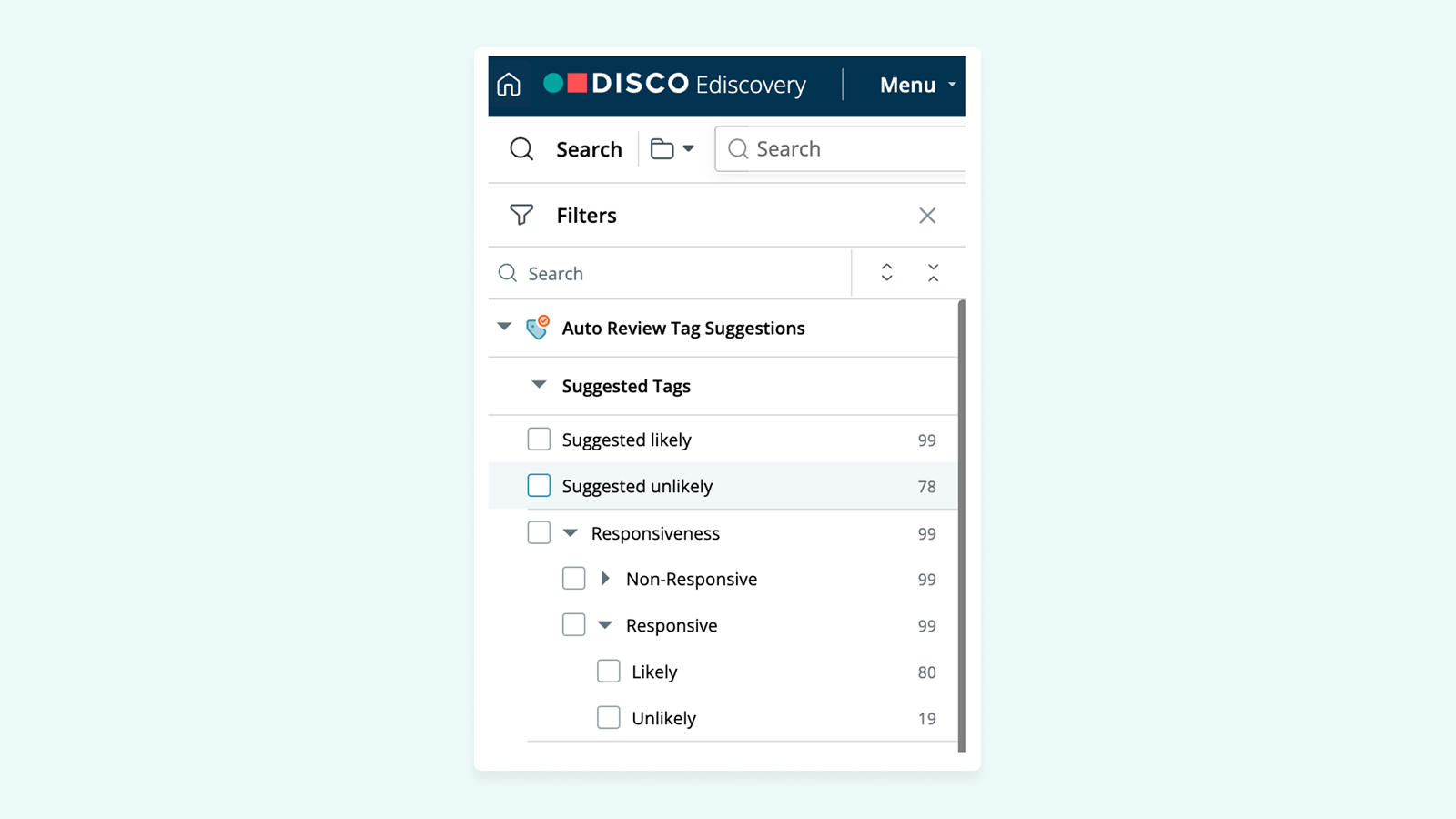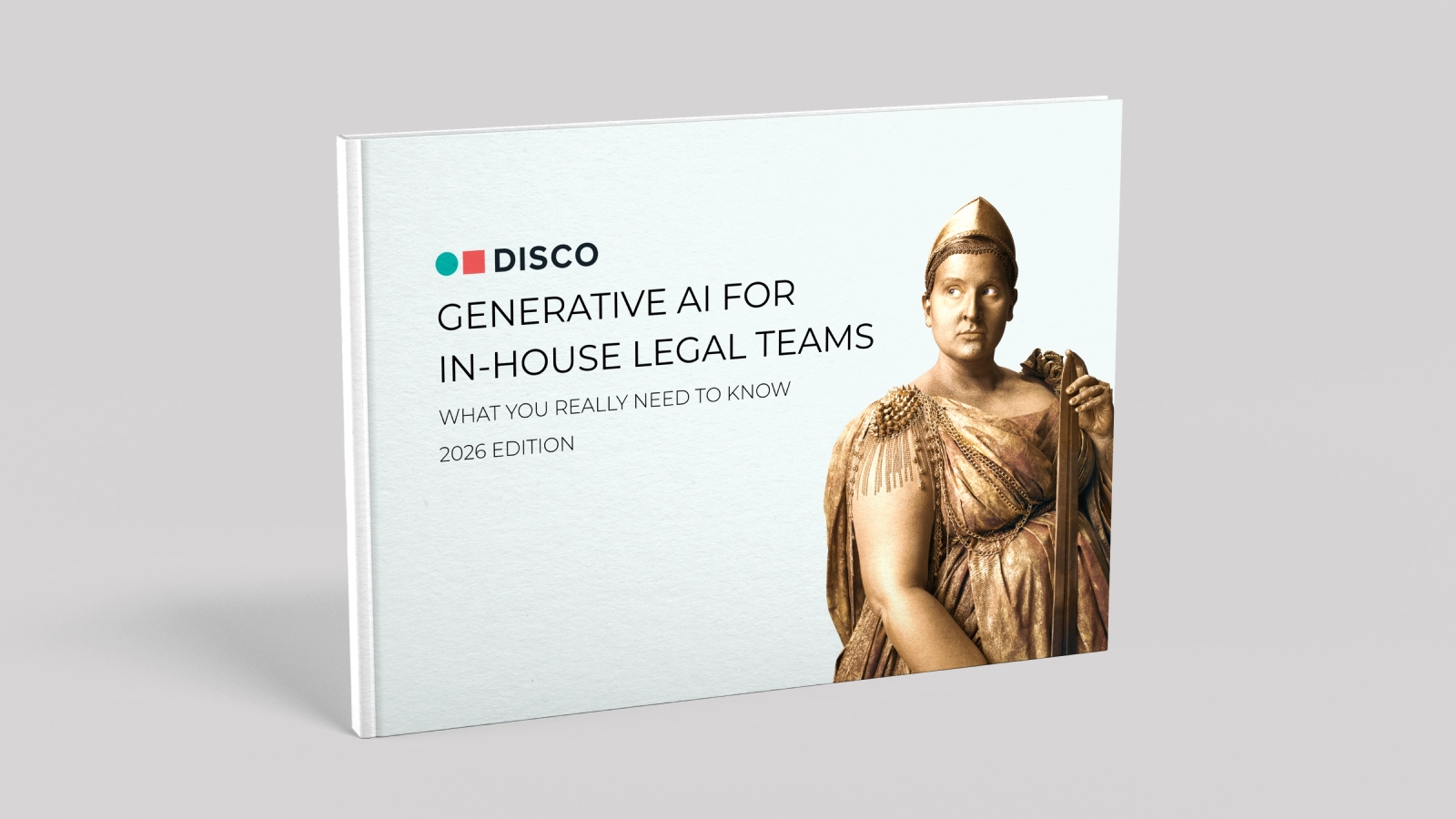⚡️ 1-Minute DISCO Download
Artificial intelligence (AI) is fast becoming synonymous with the future of legal service operation and delivery. As the American Bar Association notes, we are “in an age when it’s easy to harness computer power to engage in learning; it’s cheap, and there are massive amounts of data from which to learn.”
But how do you prepare for the AI revolution? How do you, as a technology layperson, ensure that a platform’s AI works as it should — that it actually enhances your processes and operations? How do you adopt without employing your own network of multidisciplinary specialists?
In this article we’ll clarify what “AI-assisted legal tech” means and explore how AI assistance is, already, successfully augmenting the work of human lawyers to improve value generation and ensure efficient legal service delivery.
Related: How Artificial Intelligence Changes Ediscovery 💡
What do we mean by AI and AI-powered legal tech?
AI might sound like science fiction — anthropomorphized robots developing sentience and replacing humans — but in reality AI is a broad term describing the use of automated systems capable of performing tasks normally requiring human intelligence. The use of advanced machine learning and AI to handle repetitive tasks frees up humans to focus on higher value tasks. Technology aimed at amplifying human capability drives efficiency and cost savings and creates opportunities for job growth and higher earnings for individuals and businesses.
But how can AI help lawyers when the work is so context-dependent? Think about it like this: when you were studying the law in school, you reduced case opinions to their component parts to learn legal judgment and how to use prior court opinions to inform new facts, new cases, or novel legal issues. AI is similar. It can break data like a case into its component parts that lawyers can then use their legal knowledge to apply to their cases.
Rather than replacing lawyers, AI lets lawyers use the skills they’ve developed as opposed to spending their time working on the rote mechanics of breaking a case or mountains of data into component parts. Stated simply, AI can identify similar documents, concepts, and contexts so that you can group evidence together more quickly, identify gaps more thoroughly, and tell your story more compellingly.
Why does any of this matter to lawyers? AI promises numerous business benefits for law firms: from enabling better case strategy to building and sustaining longer-term relationships with clients. The opportunity cost of cleaving to the status quo is that your firm will get left behind in the competitive race to attract talent, and win business.
AI-assisted ediscovery that transforms legal practice
So how can you integrate the benefits of AI into your workflow and cases? Adopt an AI-powered ediscovery solution, like DISCO Ediscovery, that is capable of predictive solutions. A solution that, with little effort and a small set of documents, can help lawyers identify relevant documents more quickly while dramatically reducing document volumes requiring review.
Here are five compelling ways AI-powered edisclosure can make a real difference to the business and practice of law:
1. Prioritized review
For decades, managed review teams have been using modified versions of workflows designed for paper documents or review software that wasn’t built to cope with the challenges of modern data. As a result, firms and clients regularly pay exorbitant sums for work product that is no better than what was available a decade ago.
As the range of reviewable digital data explodes, review teams unassisted by AI tools can quickly become cost- and resource-intensive. AI-assisted legal tech, however, carves a trail through that forest.
Deploying AI-assisted review can improve speed-to-evidence and achieve significant reductions in the documents requiring review. Advanced AI can understand what is relevant to a review by examining your documents, taking into account the order, meaning of words, and sentence structure to arrive at intelligent insight as to whether the document is of substance to your review. In practical terms, that means that the technology will tell you the likelihood, from -100 (highly unlikely) to 100 (highly llkely), that any given document will be relevant to your claims and defenses.
AI’s assistance to the review not only results in meaningful time savings in document review, but also enables lawyers to get to the root of the story that the evidence is telling faster. Take DISCO Review for example. Using our cutting-edge AI-powered Ediscovery technology, DISCO Review can deliver results that are 60% faster than the industry average, without sacrificing accuracy.

2. Tag suggestions
With modern AI-assisted legal tech, like DISCO AI, continuous learning allows the AI to learn and improve constantly without interrupting the review process. Rather than tell a lawyer how to run a review, the system watches in the background like a super associate, learning how to predict the lawyer’s tagging behavior. When the system has observed enough human review activity, it begins to provide tagging suggestions. It does so asynchronously, without the lawyer having to do anything other than turn on a switch. As the lawyer corrects or accepts these suggestions, the accuracy of the model increases, helping the lawyer to structure their workflows more efficiently.
AI-powered tag predictions help you organize documents into review stages, streamline review decisions, and push the most relevant materials to the start of your review. Why is this such a powerful tool? It allows you to find the evidence you care about earlier in your review than if you performed a linear review, saving time and therefore money.
You can find out more about DISCO’s tag predictions here.
3. Topic clustering with automatic indexing
As any lawyer knows, the first step to winning your case is to understand your data. Using topic clustering with automatic indexing, you get a bird’s-eye view of your documents as soon as you ingest them and from there, you can drill down into specific subtopics to find the most relevant documents quickly.
Traditionally, when a big stack of documents lands on your desk, you would have a birds-eye view of the contents of those documents — perhaps who the custodian is, the file name the custodian gave the documents, and a general understanding of what the documents might contain. With DISCO’s topic clustering, however, you will actually have information about the content of the documents before you review them, because that content is summarized, indexed, and organized with similar content. It’s the difference between going into exploratory, imprecise, and oftentimes deadly surgery in 1800s versus going into surgery today, where your surgeon has detailed data about what is going on inside of your body before making the first cut.
The result: by using topic clustering throughout the data lifecycle of a matter lawyers can:
- Explore client data in a high-level table of contents as part of early case assessment.
- Learn the language of your case and inform proposed search terms.
- Prioritize relevant topic clusters when setting up a review to enable reviewers to find responsive documents more quickly.
- Dig down into interesting subtopics to find key documents quickly.
If you want to learn more about the power of topic clustering with automatic indexing, read our data sheet here.
4. Cross-matter AI
Imagine you are representing a client in multiple matters related to similar issues. Traditionally, you would have to start your document review on each matter from scratch — making thousands of judgment calls relating to the respective relevancy of the documentation, performing new searches to identify the likely relevant documents, and using tags before you could begin to receive tag predictions. Those tag predictions would then take days or weeks to reach the highest level of accuracy.
Now imagine that you loaded your documents into a new database and your documents were automatically categorized and tagged before you had reviewed a single one. This is your new reality with cross-matter AI.
Cross-matter AI means that your software is smart enough to remember what kind of documents received which tags in your previous matters and provide predictions as soon as you spin up a new case and apply your cross-matter insight to it. You can use these tag predictions to surface potentially relevant documents, suppress junk, find hot documents, isolate privileged documents, and more.
Not only does cross-matter AI speed time to evidence, cross-matter AI presents the opportunity for law firms to productize their knowledge and expertise across matters, creating marketable differentiation from their peer law firms.
For example, imagine your Foreign Corruption Practices Act (FCPA) practice has worked on dozens of investigations. Use your work product from those past investigations to create a model that identifies documents that likely indicate bribery to surface potentially relevant documents earlier in your review, giving clients another reason to choose your team. Rather than throwing away your judgment calls at the end of each case, create custom models and market your expertise to your clients. Your biggest clients will know that coming back to your firm ensures the greatest efficiency.
To learn more about the power of cross-matter AI as a force multiplier for your firm’s past judgment calls, read our guide here.
5. Enhance the quality of your quality control (QC) process
Asynchronous QC processes can add dozens of hours to your review, thousands of dollars to your bill, and a host of unnecessary stress for your team. Waiting to QC until the end of the day, week, or review allows errors and inconsistencies to propagate and compound — meaning you have more work to do in a tighter timeframe. DISCO Ediscovery has a suite of real-time QC capabilities that enable you to avoid the headache and expense of last-minute QC. Performing QC in real time reduces stress and prevents errors by ensuring everyone is on the same page early in the review. And with fewer errors occurring, there are fewer chances that a document that shouldn’t be produced will slip through the cracks.
DISCO AI automatically detects possible mistakes by raising coding conflicts between the review team and the AI models’ predictions. This AI-driven QC process allows review managers to catch errors early, leading to a more aligned case team as the review continues. AI-driven QC also results in more accurate coding during the review, which can reduce the QC population by as much as 75%.
To learn more about the power of AI-assisted QC, read our Ediscovery solution guide.
Find out how AI-powered ediscovery and document review can transform your practice
AI isn’t the exclusive realm of data scientists and technologists — the advent of solutions built for lawyers, and the legal practice has cleared the last hurdle in creating AI that works to advance the practice and business of law. It’s never been easier to leverage the benefit of AI-powered legal tech and market your firm’s credibility and knowledge capital more effectively.
Find out how DISCO’s AI operates and what it can do for your firm today.


.webp)



%20(1).jpeg)




.avif)



